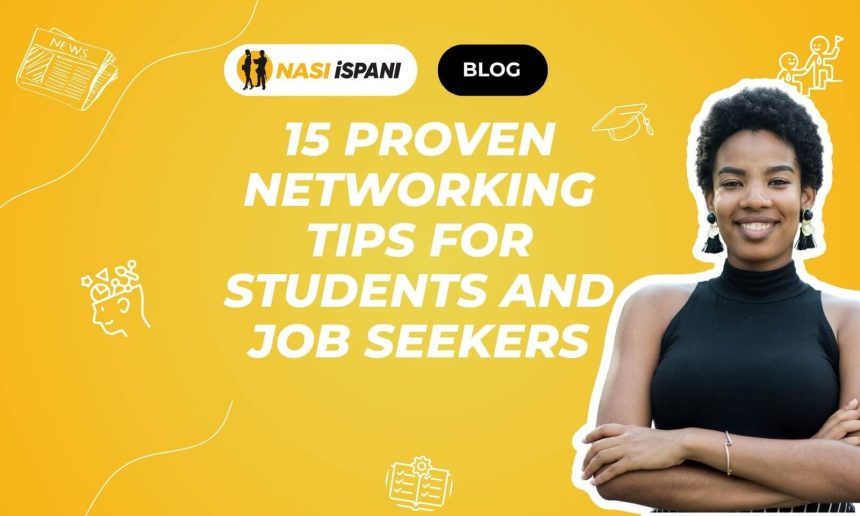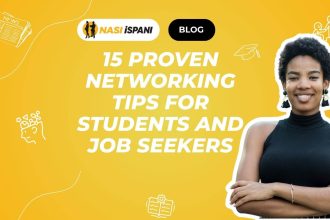In today’s competitive South African job market, effective networking can be the difference between waiting for months and securing your next opportunity. Whether you’re a student stepping into the professional world or a job-seeker ready to land your next role, these 15 tried-and-tested networking strategies will help you build meaningful connections, increase your visibility and ultimately open doors.
Why Networking Matters in South Africa
Before we dive into the tips, it’s important to understand why networking is so critical—and particularly in the South African context.
- According to the government’s “Finding a Job” booklet, many job vacancies in South Africa are never publicly advertised. Instead, they are filled through referrals, word-of-mouth, and personal networks.
- Local career-development experts also stress that networking isn’t just about exchanging contact details or business cards—it’s about building genuine trust, following up, and staying connected over time.
- For youth specifically, networking is highlighted as a key factor for thriving in South Africa’s job market. Initiatives like YES (Youth Employment Service) actively encourage young people to network to increase employability and gain exposure to new opportunities.
So if you’re a student or job-seeker in South Africa: treat networking not as an optional extra, but as a core part of your job-search or career-entry strategy.
15 Proven Networking Tips
1. Start with Your Existing Network
What to do: Reach out first to people who already know you—friends, family, classmates, former lecturers, and part-time employers.
Why it matters: According to the University of South Africa (UNISA), the best place to begin your networking is with your immediate circle and then expand from there. Also, many jobs in South Africa are filled through people you know.
How to apply it:
- Make a list of 10-15 people you know (past teacher, classmate, part-time boss, neighbour).
- Send a short message: “Hi [Name], I’m exploring opportunities in [X field] and would value your advice or any contacts you know.”
- Ask: “Do you know someone in that area whom I could talk to for 15 minutes?”
- Make sure your ask is specific and not too heavy (just advice or introductions, not immediate job demands).
2. Clarify Your Networking Goal
What to do: Define why you’re networking: is it to find internship leads? To explore a certain industry? To meet mentors?
Why it matters: As noted by Standard Bank’s young-professionals guide, being purposeful is a key “do” of networking. If you don’t know what you want, you won’t know where to target or what to say.
How to apply it:
- Write down: “In the next 90 days I want to connect with 5 professionals in [X] industry and schedule 2 informational chats.”
- Choose 1-2 focus industries (e.g., call centre operations, marketing, logistics) and list what you want to learn (e.g., “What skills matter? What entry roles are available?”).
- Use this goal to guide which events you attend, which people you approach, and what you say when you connect.
3. Prepare Your Personal Branding and Elevator Pitch
What to do: Make sure your online profiles (especially LinkedIn) and your “who I am” story are polished. Then create a 30-second “elevator pitch” that explains who you are, what you’re looking for, and why.
Why it matters: First impressions count. Standard Bank emphasises being prepared—having your LinkedIn profile up to date and being ready when opportunity arises.
How to apply it:
- Update LinkedIn: professional photo, headline (e.g., “Call Centre Graduate Seeking Customer-Service Role”), summary with 1-2 achievements or skills.
- Draft your elevator pitch: “I’m [Name], a recent diploma graduate in Business Management from [TTVET] College, passionate about customer service and fluent in [X]. I’m looking for an entry-level role where I can apply my communication skills and learn operational systems.”
- Practice it aloud (in front of a mirror or with a friend) until it sounds natural.
- When you go to networking events or connect online, lead with that pitch so people instantly understand who you are and what you seek.
4. Choose Relevant Networking Platforms and Events
What to do: Decide where you’ll network—both online (LinkedIn groups, WhatsApp job groups) and offline (career fairs, industry-association meetings, alumni events).
Why it matters: In South Africa, job-seekers frequently use WhatsApp groups, Facebook pages, and platforms besides formal job portals. Also, UNISA recommends broadening your network through industry gatherings, former colleagues, and online platforms.
How to apply it:
- Online: Join at least 2 LinkedIn groups related to your field, and search local WhatsApp groups in your city or region for job-seekers or alumni.
- Offline: Look up upcoming events (on campus, local chambers of commerce, industry expos). Mark at least 1 event in your calendar within the next month.
- Take note: when you attend, bring business cards or have a digital version of your details (QR code to LinkedIn).
- After the event, plan to follow up with 1-2 people you met (see Tip 6).
5. Be Curious and Ask Good Questions
What to do: When you meet someone, focus on learning: ask about their career path, what they’d advise, and industry trends—rather than instantly asking for a job.
Why it matters: Networking isn’t just about asking for favours—it’s about building genuine connections. UNISA emphasises that networking involves cultivating trust and confidence.
How to apply it:
- Prepare a short list of open-ended questions, such as:
- “What do you enjoy most about your role in [X]?”
- “What skills do you see as most valuable in the coming 12 months in this industry?”
- “How did you build relationships when you started out?”
- Listen actively: show interest, nod, and ask follow-up questions.
- At the end of the chat, say: “Would you mind if I stay in touch?” and exchange contact details.
- Avoid launching into “Do you have a job for me?”—this can come across as transactional and less genuine.
6. Follow Up Promptly and Thoughtfully
What to do: After meeting someone (online or offline), send a follow-up message within 24-48 hours to thank them and keep the connection alive.
Why it matters: Following up within one or two days shows you’re serious about building the relationship. Without follow-up, your initial contact can quickly be forgotten.
How to apply it:
- Message template: “Hi [Name], thanks again for speaking with me at [Event/Online]. I appreciated your insight about [Topic]. As I’m exploring opportunities in [X], I’ll keep you posted on my progress—and if you come across someone who might be helpful, I’d be grateful. Thanks again!”
- Add a value point if possible: “I found the book you mentioned on [topic]—really useful.”
- Schedule a reminder to send a brief touch-in message after 4-6 weeks: “Hi [Name], I hope you’re well. I’ve been working on [X] and thought of you. How’s everything on your end?”
- Stay present, but don’t push for a job straight away.
7. Offer Value (Don’t Just Ask)
What to do: Networking works best when it’s reciprocal. Think of ways you can help someone else—share an article, make an introduction, provide feedback, or express genuine interest in their work.
Why it matters: Building reputation and goodwill is key—and being known as someone who adds value makes others want to help you.
How to apply it:
- If you see a job post relevant to someone you just met, send it to them with a note: “Saw this and thought of our chat.”
- Post helpful articles or insights on LinkedIn about your field of interest (showing you are engaged).
- Volunteer to help with a student club or team, thereby meeting others and showing your willingness to contribute.
- When someone assists you, send a handwritten or email thank-you and offer to help them in future.
8. Leverage Informational Interviews
What to do: Request short, informal chats (15-20 minutes) with professionals in roles or industries you’re interested in—focus on gathering insights rather than job requests.
Why it matters: Informational interviews are a powerful networking tool, offering access to career paths, company culture, and hidden opportunities.
How to apply it:
- Identify 5 professionals via LinkedIn (for example, alumni from your institution working in your target field).
- Send a short message: “Hello [Name], I’m a recent [qualification] graduate exploring [Field]. I admire your career path at [Company] and would be grateful for 15 minutes of your time to learn how you got started. I’ll adapt to your schedule.”
- In your meeting: thank them, ask 3-4 prepared questions, take notes, and ask if you may stay in touch.
- After the chat: follow up with a thank-you email and mention one key learning, leaving the door open to future contact.
- Maintain the relationship by sending occasional updates or sharing something relevant without expecting something in return.
9. Use Social Media Strategically
What to do: Use online platforms (LinkedIn, Twitter, relevant Facebook and WhatsApp groups) to amplify your professional presence and make new connections.
Why it matters: South African job-seekers are increasingly using social media and WhatsApp groups for job leads and networking.
How to apply it:
- Update your LinkedIn: adjust your headline, summary, and experience. Make sure your photo is professional.
- On LinkedIn: post or share at least one article per week related to your field—this builds visibility.
- Join local LinkedIn groups relevant to your field (for example, “South Africa Call Centre Professionals” or “South African Marketing Graduates”).
- Use WhatsApp or Telegram job groups wisely—introduce yourself, mention what you’re looking for, and keep your message brief and respectful.
- Ensure your other social-media accounts (Facebook, Instagram) reflect you professionally or have privacy settings so hiring managers don’t see anything contradictory.
10. Attend and Engage at Events (Virtual & Physical)
What to do: Make time for networking events—career fairs, industry talks, student-association meet-ups, and webinars—and actively engage by asking questions and meeting people.
Why it matters: Face-to-face (or live virtual) interactions build stronger connections than passive online browsing. UNISA emphasises attending workshops, gatherings, and trade-shows.
How to apply it:
- Identify one upcoming event per month relevant to your field. Book in advance.
- Before the event: research companies or speakers and prepare two or three talking points or questions.
- During the event: bring your elevator pitch, be approachable, and exchange contacts.
- After the event: send follow-up messages.
- Even in virtual webinars: turn on your camera if possible, ask a question, and connect on LinkedIn afterwards.
11. Maintain and Grow Your Network Over Time
What to do: Networking isn’t a one-time activity—it’s a long-term investment. Regularly stay in touch, offer help, and keep adding new contacts.
Why it matters: UNISA emphasises that networking requires consistent engagement and staying connected. A network that isn’t maintained will quickly lose value.
How to apply it:
- Create a simple spreadsheet or use a contact-management tool: name, role, how you met, date of last contact, and next planned follow-up.
- Set a calendar reminder: every 6-8 weeks send a personal message (“Hi [Name], I hope you’re well. I recently started learning [X], thought you’d be interested.”)
- At least once a year, review your network and identify 3-5 people you’d like to reconnect with or newly connect to.
- When you reach milestones (secured interview, completed course), let your network know—a simple “thank you for your support” message both maintains the relationship and shows your progress.
12. Be Authentic and Show Up With Confidence
What to do: Approach networking as yourself—genuine and interested, not rehearsed or fake.
Why it matters: Standard Bank’s guidance emphasises authenticity and being comfortable with your style. People respond more positively to authenticity than over-polished personas.
How to apply it:
- When you speak to contacts, share a bit of your story: your ambition and your learning journey.
- Don’t pretend to know everything—if you’re new, say “I’m still learning… I’d love your insight on…”
- Dress appropriately for offline events (smart-casual is fine for students) and ensure your LinkedIn photo looks professional.
- Overcome nerves: remind yourself that most professionals are open to sharing—they once were where you are now.
13. Measure Your Networking Efforts and Adjust
What to do: Track what networking actions you took, which resulted in conversations or leads, and refine your strategy accordingly.
Why it matters: Without measurement you won’t know what works and what doesn’t—you might waste effort on low-yield activities.
How to apply it:
- In your contact sheet, after each month note: number of new contacts, follow-ups done, conversations scheduled, and leads generated.
- At the end of each quarter ask: which platform or event gave me the best contacts? Which messages got responses?
- Adjust: if a certain WhatsApp group isn’t giving meaningful leads, try a different one. If LinkedIn messages aren’t getting replies, change your opener.
- Celebrate small wins: a connection, an invite to an event, a kind referral—recognising this keeps your motivation high.
14. Prepare for Job-Search Synergies (Networking + Applications)
What to do: Use your network to complement your application efforts—not instead of them. When you apply for jobs, also let your network know.
Why it matters: According to the Department of Employment & Labour’s “Finding a Job” guide, networking and referrals are key channels—and should accompany your application efforts.
How to apply it:
- When you apply for a role, identify if you know anyone at the company—ask them for advice or a referral.
- Let your contacts know: “I’ve just applied for [role] at [company]. If you know anyone there or have tips, I’d appreciate it.”
- Use your network to understand company culture, required skills, and hiring processes before submitting your application—this will strengthen your CV and interview answers.
- After applications, keep the relevant contact updated: “I applied for this role—thanks again for your advice. I’ll let you know how it goes.”
15. Stay Resilient and Patient
What to do: Accept that networking and job-searching take time. Expect to reach out multiple times, face some non-responses, and yet keep going.
Why it matters: The South African job market can be particularly tough for youth and first-time job-seekers. Building connections takes time.
How to apply it:
- Set realistic expectations: aim for 5 new contacts per month, but understand maybe only 1 or 2 will respond initially.
- Keep your morale up: when you send one message and don’t get a reply, don’t take it personally—move on politely.
- Reflect on progress: you are building your network, gaining practice, and laying foundations for future opportunities—even if the job doesn’t come immediately.
- Celebrate small wins: getting a meeting, receiving advice, improving your LinkedIn profile—each is progress.
- Stay positive: your consistent effort builds reputation, visibility, and relationships.
Also check: 10 Common Interview Questions for Seasonal Jobs (Updated October 2025)
Effective networking is not about gimmicks or massive contact lists—it’s about purposeful, consistent, genuine connections. Especially in South Africa, where many opportunities are hidden from public listing and rely on referrals, building a strong network is a smart career strategy.



